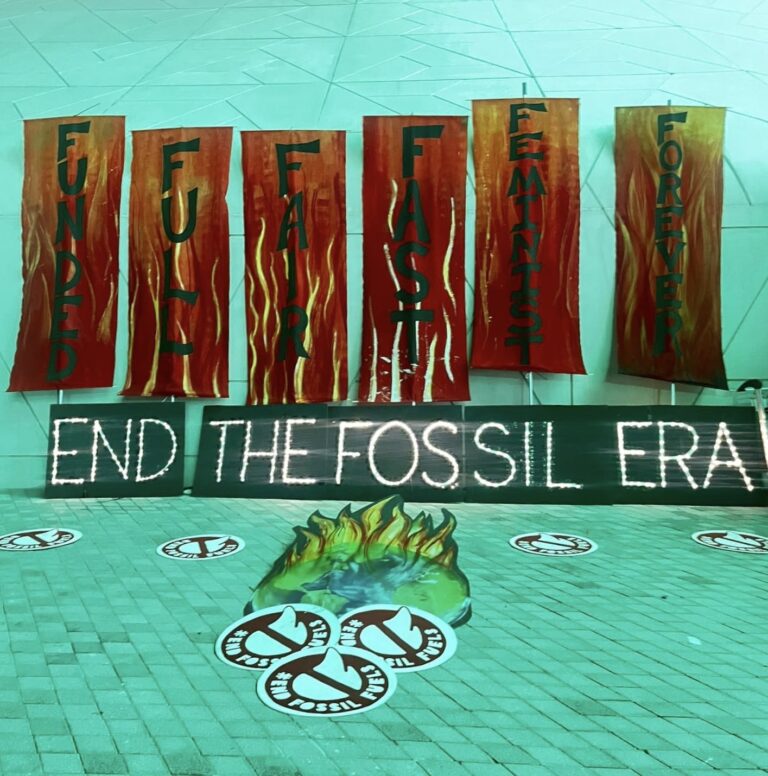Waterkeeper Alliance, Waterkeeper Groups React to Final COP28 Deal, Call on World Leaders to Support a Proposed Fossil Fuel Non-Proliferation Treaty
By: Waterkeeper Alliance

In response to the historic climate deal struck at the United Nations Framework Convention on Climate Change Conference of the Parties (COP28) today in Dubai, Waterkeeper Alliance and Waterkeeper groups — Bocas de Ceniza Waterkeeper (Colombia), La Paz Waterkeeper (Baja California Sur), Tijuana Waterkeeper (Mexico), Waterkeepers Bahamas, and Waterkeepers Bangladesh — call for all nations, organizations, and individuals to endorse a negotiating mandate for a Fossil Fuel Non-Proliferation Treaty.
The final text of the deal was a step forward in some aspects, such as naming the transition away from fossil fuels for the first time in an official COP agreement; however, significant loopholes remain. The emphasis on the process of a transition rather than the goal of a full phaseout is highly problematic and unlikely to achieve the necessary accountability for fossil fuel nations. Other problems involve nods to unproven fossil fuel abatement technologies, woefully inadequate action on loss and damage payments for the hardest hit countries, and a lack of clear interim targets that align with the science for a credible pathway to limit climate change to 1.5º C.
Against this backdrop, the groups contend that a Fossil Fuel Non-Proliferation Treaty is a necessary step to limit and end the root cause of the climate emergency. As an endorser of the call for a treaty, Waterkeeper Alliance applauds the historic actions taken at COP28 by Colombia, the Pacific Island nation of Nauru, the Republic of Palau, and the Pacific Island nation of Samoa to formally join the bloc of nation-states seeking a negotiating mandate for a Fossil Fuel Non-Proliferation Treaty. The proposal is now backed by 12 nation-states from four continents.
As the first Latin American country and largest producer of coal and gas in that region, Colombia’s historic action is a beacon to other top fossil fuel producing nations, including the U.S., to immediately shift to a managed shut down of fossil fuel extraction. For example, a phaseout of fossil fuels would be a necessary component to any serious commitment from the Biden administration to reduce U.S. greenhouse gas emissions; yet the nation remains in expansion mode, which undermines any potential reduction of its carbon impact and aspirations for a transition to clean and renewable energy.
“It’s time for the United States and other nations to build on the momentum gained at COP28 to endorse and advance the proposed Fossil Fuel Non-Proliferation Treaty. Fossil fuels have been scientifically proven to pollute our waterways and climate throughout their life cycle, including extraction, transportation, combustion, and disposal. Nothing but a fast, fair, and full phaseout of fossil fuels will meet the aggressive emission targets and avert potentially devastating and irreversible impacts of global climate change.” – Marc Yaggi, CEO, Waterkeeper Alliance
“President Petro’s announcement sends a clear message to the world. Colombia is the eleventh country – first in Latin America – to join this initiative of a Non-Proliferation Treaty of Fossil Fuels, despite being an oil producing country with the largest open pit coal mine in Latin America and whose economy still depends on the extraction and commercialization of fossil fuels. Petro’s message is disruptive and invites other countries in the region, and the world, to be guided by a single cause: saving the planet from extinction, which our eyes will not see but future generations will inherit. We have a moral and ethical duty to guarantee them a planet where life is possible.” – Liliana Guerero, Bocas de Ceniza Waterkeeper in Colombia
“The transition towards renewable and sustainable energy sources is imperative to reduce greenhouse gas emissions.” – Hector Trinidad, La Paz Waterkeeper in Baja California Sur
“This treaty is the mechanism that the world needs to manage a just and global transition away from coal, oil, and gas. History shows that this is possible if we all unite and actively participate in our field of action from all corners of the planet.” – Margarita Diaz, Tijuana Waterkeeper
“As we have been victims of the climate impacts fueled by the industry, the collective decision made by each country making the bold step to join this Treaty says to The Bahamas that we want to see to the survival of your people, your lands, and your waters.” – Rashema Ingraham, Waterkeepers Bahamas
“This is good news, but we need more universal support for this effort for it to succeed. Unfortunately countries in the global north are highly influenced by the fossil fuel industry. This is evident by more than 2700 fossil fuel lobbyists here at COP28, the most ever at a COP. These countries need to listen to the voices of those that stand to suffer the most from their inaction on fossil fuels.” – Sharif Jamil, Waterkeepers Bangladesh
This reaction comes in the wake of Waterkeeper Alliance’s participation at COP28 where an international delegation, including Waterkeepers Bahamas, Waterkeepers Bangladesh, Bargny Coast Waterkeeper (Sénégal), Hann Baykeeper (Sénégal), and Kissimmee Waterkeeper (Florida), joined other voices in a unified demand for world leaders to commit to a fast, fair, and full phaseout of fossil fuels; support a proposed Fossil Fuel Non-Proliferation Treaty; take achievable steps to reduce emissions; and invest in climate resiliency and adaptation, particularly in communities at the highest risk of experiencing the most harmful impacts of ongoing climate change.